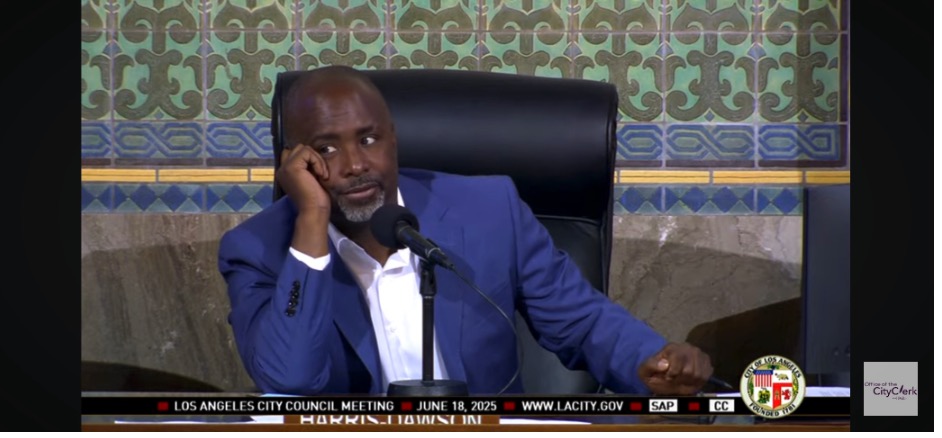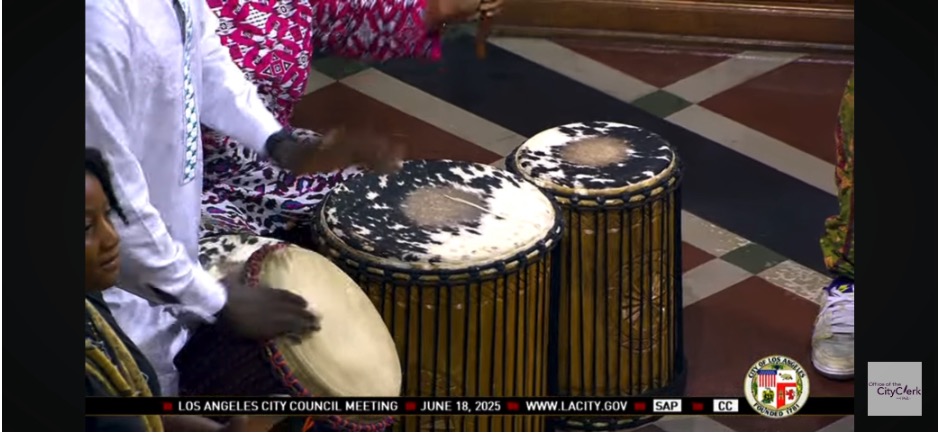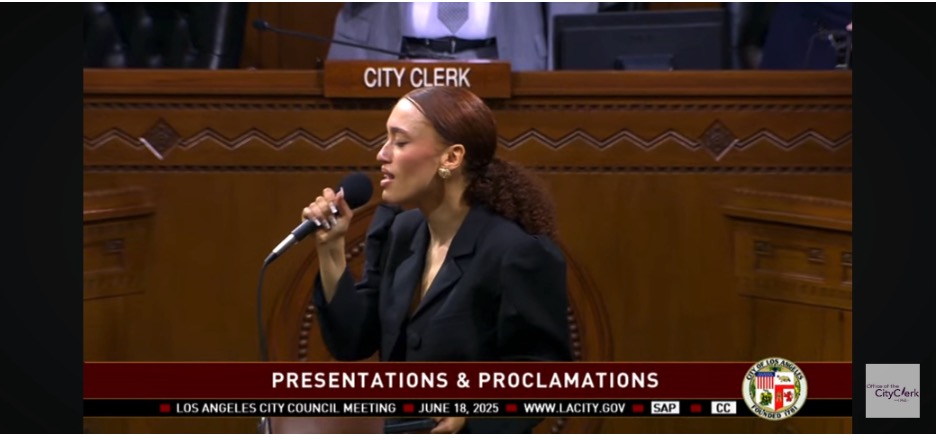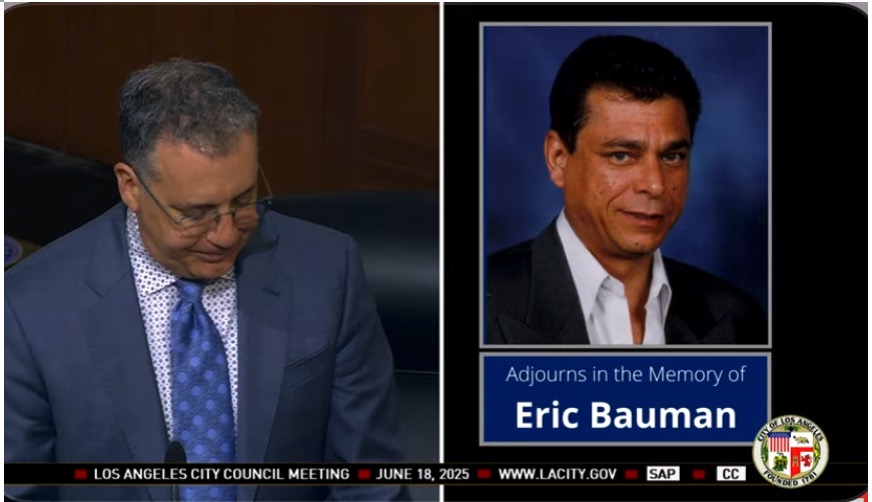Comments
ERIC PREVEN’S NOTEBOOK - Welcome to LA, host of the 2028 Olympics, where spectacle meets helicopter chases. Banners are up, benches are gone, and unrest is rebranded as "ambiance." This isn’t the glossy airport guide—it’s your survival script for demagnetized TAP cards and missing restrooms.
Arrival at City Hall
The Rotunda hosts democracy with pat-downs and banned words (use “unscripted civic moment,” not “riot”). Restrooms demand a civility oath and a frisk, located past the evicted Korean ship, now an Olympics ticketing booth.
Navigating the City
LA Metro is a $15-billion chaos experiment—trains follow cosmic whims, buses ignore you and Help buttons are decorative. Bring a TAP card and a bribe. Driving means enduring the 405’s futility, $20-$200 parking, and vague street signs. Olympic Express shuttles are VIP-only.
Surviving the Ecosystem
Watch for Nimbys, friendly until density looms—whisper “heritage tree” to escape. The Kumbaya Collective thinks “receive and file” solves all. The Pitchfork Alliance wields city charters and stun gun coupons. Developers promise affordable housing after rooftop pools. If a standoff brews, toss an Environmental Impact Report and flee. Coyotes are less territorial.
The Attractions
Museum Mile offers donor-branded temples, free with LA28 connections. The Inglewood Loop is a public-private fantasy with $20 “equity bowls.” The Pacific View Trail, once a neighborhood, is now an event space—bring water.
Final Note
LA is a surveilled sanctuary with potholes, a blockbuster called LA 2028. You’re an extra—play your part, don’t touch the set, and avoid saying “riot.”

President Marqueece Harris-Dawson is looking forward to the Olympics.
Will the Lucas Museum Be for Everyone—or Just Those Who Can Pay?
Picture a South LA schoolkid, gazing at the Lucas Museum of Narrative Art’s gleaming spaceship in Exposition Park, wondering if its stories are for them—or just for those who can pay. Los Angeles lives on stories, from murals in Pacoima to Hollywood’s screens. George Lucas and Mellody Hobson’s billion-dollar museum promises to celebrate this narrative art, connecting us through works like Judy Baca’s Great Wall of Los Angeles. But eight years in, their silence on admission fees betrays the inclusive vision they claim to champion.
In a city where the Broad, MOCA, Hammer, CAAM, and California Science Center open their doors for free, this opacity stings. The museum, rising on public land, recently announced a free outdoor campus—landscaped by Mia Lehrer—where anyone can walk through or grab a coffee. It’s a promising start, but it leaves us wondering: will the art inside be accessible, or will it come with a price tag?
This museum, nestled among free institutions, must reflect the public trust. A narrative museum, by its own mission to “shape a more just society,” should tell stories for all, not just those who can afford a ticket. Yet, the question persists: will families from Watts or schoolkids from the 400 schools nearby face a paywall?
Let’s consider the cost of free admission. The Science Center draws 2.2 million visitors annually. At $20 per ticket, that’s $44 million a year, or $880 million over 20 years. For Lucas, who sold Star Wars for over $4 billion, and Hobson, co-CEO of Ariel Investments, this is a fraction of their wealth. They’ve pledged to fund this museum as a gift to Los Angeles—why not make it a true gift by covering admission for 20 years?

Bob Blumenfield adores Juneteenth drumming, but not on animal hides.
The financial upside makes this feasible. Museum gift shops and restaurants are revenue engines. Industry benchmarks, like the Getty’s $10–$15 per visitor in retail and dining, suggest the Lucas Museum could earn $12 per person with 2.2 million visitors, generating $26.4 million annually—$528 million over 20 years. Add $2 million a year from event rentals, based on LACMA’s model, and that’s $568 million. With Star Wars’ global draw, 3 million visitors annually are within reach, yielding $45 million a year at $15 per person, or $940 million over 20 years. Even accounting for operational costs, this could cover free admission, with surplus for programming or Jedi-inspired gardens.
This isn’t just economics—it’s justice. Los Angeles is the capital of free cultural access. Will Kadir Nelson’s or Robert Colescott’s works, acquired for inclusivity, be locked behind a fee? Will kids who pass Baca’s mural be priced out of its legacy in your galleries?
George, your films taught us heroes and sheroes rise against odds. Mellody, you’ve championed equity. You both signed the Giving Pledge, vowing to use wealth for good. So, make this museum free. Fund $880 million for 20 years of access, letting $568–$940 million in revenue ensure sustainability. Let every Angeleno, from Watts to Westwood, be inspired by narrative art.
Choose otherwise, and Angelenos will rally, voices united, to demand a museum for all. Make this a story of fairness, where the Force flows through everyone (in multiple languages.)

The young Dodger fan who spontaneously sang the national anthem in Spanish.
The Flop Heard Round the Hall
Act I: The Dive
Italian footballers don’t fall—they stage operatic collapses, clutching shins, then pirouetting upright. American politicians in 2025 play the same game. NYC Comptroller Brad Lander links arms outside an immigration court, feigning shock as feds cuff him. Senator Alex Padilla faceplants in a D.C. hallway, delivering a viral detainment speech. Republican Rand Paul stages a Capitol sit-in over drones, daring agents for the X livestream. These aren’t protests—they’re flops, choreographed for X’s algorithm.
The issues—immigration, justice, surveillance—are real. The playbook? Pure Serie A: dive, cry, camera.
Act II: My Yellow Card
In 2016, I ran for Studio City Neighborhood Council, a body debating poopy bags. I won, challenging a traffic-choking riverfront project. Then, a foul: Stuart Miller claimed I had electioneered by standing near the polls. Witnesses said I “disgusted” voters. Disqualified, then reinstated with a framed reprimand letter—proof the system loves a grudge. No cuffs, just two LA Times clips and a warning: don’t loiter with democratic intent.
Act III: The Playbook
How to Get Cuffed and Win X
Arrests in 2025 Are Strategy, Not Stumbles. Here’s the Flop Formula:
-
Pick Your Pitch: Choose a cause with heat—immigration courts, not budget hearings.
(Note: Check X trends.) -
Skirt the Line: Get close, not criminal. Link arms, dare the feds to blink.
(Note: Prayer circles beat picket signs.) -
Flop Like a Pro: Slump as cuffs click, murmuring, “This isn’t justice.”
(Note: A quivering lip adds views.) -
Cue the Comms: Drop an all-caps email—“LANDER CUFFED!”—before booking. Stage a vigil.
(Note: GoFundMe by noon.) -
Drop the Monologue: Tie your cuffs to the voiceless in 280 characters.
(Note: Voters scroll fast.) Payoff? You’re a cause. Cynical? Sure. Necessary? Maybe.
Act IV: Highlight Reel
2025’s flops clog X’s feed:
-
Brad Lander: Arm-links at immigration court, cuffs glint, fundraising email by dessert.
Optics: 8/10. -
Alex Padilla: Hallway slump in L.A., CSPAN quiver almost trends.
Optics: 4/10. -
Rand Paul: Drone sit-in, strong libertarian flex, weak hashtag.
Optics: 6/10. -
Ras Baraka: Storms ICE facility, gets cuffed, eyes lieutenant governor.
Optics: 9/10. It’s not courage—it’s choreography for X metrics.
Act V: The Civic Detention Tunnel™
LA needs a retractable walkway from City Hall to “Exit Stage Justice”—EIR-compliant, with donor chyrons and a Broad-sponsored tear-mister. Paul Krekorian, dissent-wrangling pro, should helm it. Perks: QR-coded CEQA reports, selfie zones, GoFundMe Wi-Fi. If electeds flop, give ‘em a stage.
In LA, jacarandas fall, Metro limps, and electeds flop like strikers chasing a call. They’re performing for contact, cuffs, and cameras. The issues are life-or-death; the dives, rehearsed. The algorithm, not the ref, calls the game. In 2025, nothing tops X amplifying the fall.

Eric Bauman, a former LA and CA democratic party leader passed away. RIP.
Miss you, too: The sonofabitch was born in a market crash, warning your portfolio’s next with the glee of a doomsday prophet. A lawyer by trade, temperament, and the reason dinner parties needed a safe word, he built a long, illustrious career advising the REDACTED to keep certain types from getting too cozy.
He loved culture, mostly as a tax dodge and a chance to name-drop. Opera was divine, provided someone else paid, and he could sneak out at intermission. He once bankrolled a museum wing, thinking it was a Michelin-star bistro.
When asked to meet his in-laws, he sneered, “I’m booked until the next regime change.”
He didn’t suffer fools—he bred them, hired them, promoted them, then fired them for betrayal. He harassed the secretarial pool with the persistence of a telemarketer and the consequences of a Teflon Don.
Even in his final years, wielding a cane and weaponized spite, he could make a nurse cry with a single eyebrow twitch.
He gave back to the community like a raccoon to a campsite: loud, messy, and only at night.
Holidays were for fundraising in exotic locales; he skipped his kid’s wedding for a “desert resilience” scam on a Pharaoh’s yacht, cooked up between overpriced mojitos and shady massages.
He is survived by several offshore accounts and a pending ethics complaint.
Ethical Culture:
According to testimony, Councilmember Staffer B John Lee took $1,000 in casino chips—not for himself, but while gambling on behalf of someone else at a baccarat table. That’s not public service. That’s how money gets laundered in the movies. And in City Hall, apparently.
Now this is the same REDACTED who chairs Public Safety, hikes up the cost of city services, and still expects us to believe he wasn’t gambling—he was just... facilitating. So let’s say he wins: would the winnings go back to the developer? Was there a cut? Was there a deal?
And we’d like the OFFICIAL transcripts, please—from Kennedy Court Reporters who just got a nice contract renewal and increase. Full testimony. No redactions. And one question: does Mr. Lee have a cooperation agreement with the FBI? Some of us were curious.
But kudos for getting him on the stand, finally. It only took five years and a taxpayer settlement to make it happen.
Now, turning to public comment access: City Council claims to be using the Randomizer™, but it’s become a parody. Three buses full of residents sign up—then hear Groat singing, “Sorry, Charlie” in multiple languages with 72 hours’ notice. The speakers are lined up, the cards are in, but Marqueece Harris-Dawson shuts ‘em all down.
Unlike this hallowed Commission, the City Council isn’t even pretending to follow the rules. No speaker should be left behind. Especially not when the stakes are this high. Thank you.
(Eric Preven is a Studio City-based TV writer-producer, award-winning journalist, and longtime community activist who won two landmark open government cases in California.)













